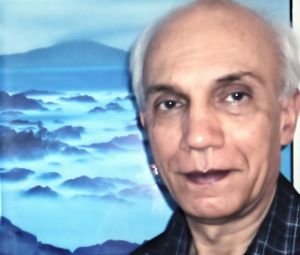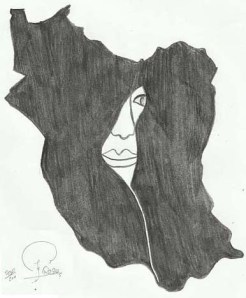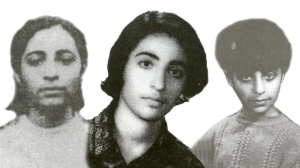۱۳۹۲ اسفند ۲۹, پنجشنبه
تاريخچۀ سرود «بهاران خحستهباد»: سایت پرند
دریافتی:
هوا دلپذیر شد، گل از خاک بردمید
تاريخچۀ سرود «بهاران خحستهباد»
«قرن ما، روزگار مرگ انسانيت است.
«به بانوی سوگوار، که در ماتم شهيد
در
واقع این شعر به همسر «پاتریس لومومبا» هدیه، و در تسلا و همدردی با او
سروده شده بود. البته میتوان حدس زد همسر داغدار آن رهبر انقلابی، شاید که
هیچگاه از این همدلی شاعر ایرانی آگاه نشده باشد، ولی میدانیم که همین
چند بیت و چهار پاره از بهمن ماه سال پنجاه و هفت به بعد ـ تا امروز حتی ـ
سرود بهاران ما بوده و هست.
سرودی
امیدبخش و روحیهدهنده که میرفت در پشت دیوارهای قطور و میلههای
سربیرنگ سلولهای زندانهای سیاسی شاه از یادها برود و خاکستر شود، در
ساعت یازده و نیم صبح روز بیست و نهم بهمن ما ه سال پنجاه و هفت دوباره جان
گرفت و متولد شد. در تالار اجتماعات مدرسهی عالی تلویزیون، همانجا که
سالی پیش «کرامت دانشیان» دانشجوی رشته کارگردانیاش بود.
در
اسفند ماه سال ۱۳۳۹ در مجلۀ «سپید و سیاه» شعری با عنوان «سرود بهار» در
سوگ «پاتریس لومومبا» و خطاب به همسر او، از دکتر «عبدالله بهزادی» چاپ شد.
[نشریۀ «فرهنگ نوین» چاپ تهران، بهمن ۱۳۵۹ (یادنامه دانشیان)، صفحات ۱۱ - ۱۲].
«اسفندیار
منفرد زاده» که خود نیز در رابطه با پروندۀ «خسرو گلسرخی» توسط «ساواک»
دستگیر و مدتی را در زندان اوین گذرانده بود، با سابقۀ درخشانی که به عنوان
آهنگساز، هم در سینما و هم در خلق ترانههای که به «ترانۀ معترض» شهرت
یافت، در واقع کسی است که سرود «بهاران خجستهباد» را به شکلی که امروز
میشنویم خلق و ماندگار کرد.
آنگونه
که پیداست سرودی که امروز ما با نام «بهاران خجستهباد!» میشنویم نه آن
است که در آغاز با صدای «علی برفچی»، «عبدالله و ابوالفضل قهرمانی»، «فرهاد
مافی»، «حسن فخار» و «پدرام اکبری» تمرین و در استودیوی «صبا» به مدیریت
«رحیم شبخیز» ضبط شده، بلکه نسخهای است که با صدای «اسفندیار منفرد زاده» و
همصدایی همسر او «شهلا فاطمی» و یکی از دوستان مشترکشان «مینو وزیری»
اجرا شده.
و
اما حکایت این سرود کوتاه از قرار بلندتر از آنی است که ما نوشتیم و شما
خواندید. همانطور که نوشتیم هالهای از حدس و گمانهایی که در اینجا و آنجا
بوده و آمده نیز، چهرۀ تابناک و روشن این سرود را در پردۀ شک و ابهام
پوشانده که از آنها درمیگذریم.
«.
. . اكنون هم، هرساله به هنگام بهاران، با شنیدن نغمه ترانه «بهاران خجسته
باد!» خاطره میلیونها تن از مردم سرزمین ما به دوردست بهاران انقلاب
پرواز میكند و یاد آغازه بهار آزادی و شور زندگی در دلها زنده میشود.
و
بالاخره روایت حکایت آن سرود را در اینجا به پایان میبریم. جز «کرامت
دانشیان» که در سحرگاه ۲۹ بهمن سال ۱۳۵۲ «تن به نور» سپرد و دیگر نیست،
خوشبختانه بقیه و همۀ آنهایی که در شکل گرفتن و خلق و ماندگاری این اثر دست
اندر کار و سهیم بودند، هنوز هستند و امید که باشند و اگر این نوشتار به
رویت آنها که هر کدام در گوشهای از این جهان به مشغلهای گرفتار رسید و در
آن سهو و خطایی دیدند، به کاتب این حکایت گوشزد کنند که گوشی شنوا دارد و
دلی امیدوار.
لینکهای مرتبط با مطلب در این سایت:
در بارۀ «اسفندیار منفردزاده» در این سایت:
http://www.parand.se/t-baharan-khojasteh-bad.htm
«بهاران خحستهباد»
هوا دلپذیر شد، گل از خاک بردمید
پرستو به بازگشت زد نغمهء امید
به جوش آمدست خون درون رگ گیاه
بهار خجسته باز فراوان رسد ز راه
به خویشان، به دوستان، به یاران آشنا
به مردان تیز خشم که پیکار می کنند
به آنان که با قلم تباهی و درد را
به چشم جهانیان پدیدار می کنند
بهاران خجسته باد
بهاران خجسته باد
و این بند بندگی
و این بار فقر و جهل
به سرتاسر جهان
به هر صورتی که هست
نگون و گسسته باد
نگون و گسسته باد
=============
http://www.parand.se/t-baharan-khojasteh-bad.htm
تاريخچۀ سرود «بهاران خحستهباد»
در عصر و روزگار ما پیوند و بههم پیوستگی و در غم هم بودن آدمها ضرورتی است که از مقولاتی چون رنگ پوست و زبان و مذهب و حتی مرزهای جغرافیایی گذشته و جداست. نمونۀ آن قتل «پاتریس لومومبا» رهبر جنبش ملی کنگو در آفریقا به دست «موسی چمبه»، است و تاثیری که مرگ مظلومانۀ او بر ادبیات و حس همبستگی انسانی از جمله در شاعران معاصر ایرانی میگذارد.
تصویر «پاتریس لومومبا» قبل از کشته شدن
شاید یکی از اولین اشارهها بر مرگ بهناحق رهبر «جبهه ملی کنگو» را بهتوان در سرودۀ «اشکی بر گذرگاه تاریخ» سرودۀ «فریدون مشیری» دید. آنجا که میگوید:
«قرن ما، روزگار مرگ انسانيت است.
سينۀ دنيا ز خوبیها تهیست.
صحبت از آزادگی، پاکی، مروت ابلهیست.
صحبت از «موسی» و «عیسی» و «محمد» نابجاست،
قرن «موسی چومبه»هاست . . .»
ولی بدون شک «سرود بهار» از دکتر «عبدالله بهزادی» که در اسفند ماه سال ۱۳۳۹، یعنی چند هفتهای بعد از کشته شدن «لومومبا» در هفتهنامۀ «سپید و سیاه» بهچاپ رسید، اولین اظهار همدردی و همدلی یک شاعر ایرانی در رابطه با مرگ این رهبر انقلابی آفریقایی است. در بخشی از این سروده که ما بیشتر آن را با عنوان «بهاران خجستهباد» میشناسیم، آمده:
«به بانوی سوگوار، که در ماتم شهيد
بناليد و زان نوا، دل عالمی تپيد
بهاران خجستهباد!»
در
واقع این شعر به همسر «پاتریس لومومبا» هدیه، و در تسلا و همدردی با او
سروده شده بود. البته میتوان حدس زد همسر داغدار آن رهبر انقلابی، شاید که
هیچگاه از این همدلی شاعر ایرانی آگاه نشده باشد، ولی میدانیم که همین
چند بیت و چهار پاره از بهمن ماه سال پنجاه و هفت به بعد ـ تا امروز حتی ـ
سرود بهاران ما بوده و هست.
سرودی که «کرامت دانشیان» آن را در
سلولهای دوران دربند بودنش زمزمه کرده بود و بعد به همت «اسفندیار
منفردزاده» برای آن آهنگ نوشته و اجرا شد.
میدانیم که بسیاری سرایندۀ شعر سرود «بهاران خجستهباد!» را «کرامت دانشیان» میپندارند. دلیل آن همین که این سرود را اولین بار از زبان او شنیدهاند. حتی در نشریات مختلفی که در سال اول بعد از انقلاب منتشر شد، بر بالای متن چاپ شدۀ ابیات این سروده، مینوشتند: «سرودهای از کرامت دانشیان». و چه بسا این باور و برداشت عموم مردم از مطالعۀ همان نشریات سرچشمه گرفته باشد، حال اینکه شعر این سروده که «سرود بهار» نام داشت از دکتر «عبدالله بهزادی» بود و در اسفند ماه سال ۱۳۳۹ یعنی چند هفتهای بعد از ترور و کشته شدن «پاتریس لومومبا» و در همدردی و تسلی به همسر او، در هفتهنامۀ «سپید و سیاه» بهچاپ رسید.
نمونهای از اصل این سروده را به شکلی که در «سپید و سیاه» چاپ شده در اینجا ببینید.
از یاران و دوستان نزدیک «کرامت دانشیان» و همبندانان با او که بگذریم، ما همه این سرود را در اولین روزهای پیروزی انقلاب در بهمن ماه سال پنجاه و هفت شنیدیم. آنهایی که با «کرامت» همسلولی بودند البته قبلا از ما این سرود را بارها با صدای خوشی که او داشت و آهنگی که خود او بر آن نهاده بود، شنیده بودند. در واقع همین همدلان و یاران او بودند که این یادگار از او را به بیرون از زندان آوردند و به ما سپردند.
سرودی
امیدبخش و روحیهدهنده که میرفت در پشت دیوارهای قطور و میلههای
سربیرنگ سلولهای زندانهای سیاسی شاه از یادها برود و خاکستر شود، در
ساعت یازده و نیم صبح روز بیست و نهم بهمن ما ه سال پنجاه و هفت دوباره جان
گرفت و متولد شد. در تالار اجتماعات مدرسهی عالی تلویزیون، همانجا که
سالی پیش «کرامت دانشیان» دانشجوی رشته کارگردانیاش بود.
اولین اشاره به چگونگی خلق این سرود را در نشریه «فرهنگ نوین» شماره بهمن ماه ۱۳۵۹ میخوانیم:
در
اسفند ماه سال ۱۳۳۹ در مجلۀ «سپید و سیاه» شعری با عنوان «سرود بهار» در
سوگ «پاتریس لومومبا» و خطاب به همسر او، از دکتر «عبدالله بهزادی» چاپ شد.
سالها بعد «کرامت دانشیان» با چند بیت از این شعر سرودی ساخت که بهنام
«بهاران خجستهباد!» معروف است. سرودی که کرامت با صدای گیرایش آن را
میخواند. حتا به بچههای مدرسهی روستای «سلیران» هم آنرا یاد داده بود،
بهطوریکه صبحها، سر صف بهجای «سرود شاهنشاهی» بچهها «بهاران
خجستهباد» را میخواندند.
بعدها این سرود همراه با «کرامت» به
زندان رفت و سرود جمعی بچههای سیاسی شد. «بهاران خجسته باد!» یادگار
«کرامت» بود که در یاد رفقای همبندش در زندان باقی ماند.
هر که «کرامت» را میشناخت، «بهاران خجسته باد!» را حتما از زبان او شنیده بود و همصدا با او خوانده بود.
پس از قیام همراه با آزادی زندانیان سیاسی، «بهاران خجسته باد!» هم بهمیان مردم آمد.
در یک هفته فاصلۀ میان قیام ۲۲ بهمن ۱۳۵۷ تا سالروز شهادت «کرامت» و «خسرو
گلسرخی» رفقای نزدیک «کرامت» که خود را آمادۀ برگزاری بزرگداشت سالروز
شهادتش میکردند، به پیشنهاد «پدرام اکبری» تصمیم به اجرای سرود«بهاران
خجسته باد!» میگیرند.
«پدارم اکبری» و «حسن فخار»، سرود را ـ
آنچنانکه از کرامت به یاد داشتند ـ میخوانند، «اسفندیار منفردزاده» نت
موسیقی آنرا مینویسد و به علت نبودن امکانات کافی و دسترسی نداشتن به
ارکستر، خود به تنهائی تمام سازها را ابتدا تکتک مینوازد و بعد همه را با
هم میکس میکند.
خوانندگان سرود عبارت بودند از: «علی برفچی»،
«عبدالله» و «ابوالفضل قهرمانی»، «فرهاد مافی»، «حسن فخار» «پدرام اکبری» و
«اسفندیار منفردزاده».
پس از چند روز تمرین، سرانجام در ساعت
یازده و نیم صبح روز ۲۹ بهمن ۱۳۵۷، «بهاران خجسته باد!» ضبط میشود. مسئول
ضبط [رحیم] «شبخیز» بود. مخارج استودیو [صبا] را هم «منفردزاده» میپردازد.
سرانجام، هنگامی که مراسم یادبود و بزرگداشت «کرامت» و «خسرو» در مدرسهی
عالی تلویزیون در حال برگزار شدن بود، رفقا خسته، نوار ضبط شده و آمادهی
«بهاران خجسته باد!» را مستقیما از استودیو به سالن برگزاری مراسم میآورند
و نخستین بار در آنجا پخش میشود.
«بهاران خجسته باد!» جزو نخستین سرودهائی بود که پس از قیام از رادیو و تلویزیون پخش شد و میشود . . .
[نشریۀ «فرهنگ نوین» چاپ تهران، بهمن ۱۳۵۹ (یادنامه دانشیان)، صفحات ۱۱ - ۱۲].
«اسفندیار
منفرد زاده» که خود نیز در رابطه با پروندۀ «خسرو گلسرخی» توسط «ساواک»
دستگیر و مدتی را در زندان اوین گذرانده بود، با سابقۀ درخشانی که به عنوان
آهنگساز، هم در سینما و هم در خلق ترانههای که به «ترانۀ معترض» شهرت
یافت، در واقع کسی است که سرود «بهاران خجستهباد» را به شکلی که امروز
میشنویم خلق و ماندگار کرد.
او در یادداشتی به تاریخ ۲۴ آوریل
سال ۲۰۰۴ [میلادی] در استکهلم سوئد، ما را با گوشهای دیگر از تاریخچۀ این
اثر آشنا میکند. «منفرد زاده» در یادداشت خود توضیح میدهد که چون در
ابتدا هیچیک از یاران و همبندان «کرامت» نام سرایندۀ اصلی شعر را
نمیدانستند، به «سیاوش کسرایی» مراجعه میکنند. و مینویسد:
«.
. . سیاوش كسرایی گفت شاعرش را نمیشناسد. شعر روی كاغذ، نغمه میطلبد.
حسن [فخار] و پدرام [اکبری] در حافظۀ خود گردش میكنند تا ملودی سرود را
بیابند. زمزمه میكنند و آنچه میخوانند هربار شكلی متفاوت دارد و گاهی
شباهتهایی به كارهای شنیده شده پیدا میكند.
میپرسم: «شاید كرامت این شعر را بر بستر آهنگی شناخته شده نوشته باشد؟»
پاسخ اما چیزی را روشن نمیكند. آنگاه آنچه را این دو عزیز روایت
میكنند، بر «پنج خط» مینویسم و سپس، بنابر ضرورتهای فُرم موسیقایی در
تلفیق با شعر موجود، حركتِ ملودی را رسم میكنم و به تمرین و تنظیم و ضبط
آن میپردازم. البته صدای «مینو وزیری» و «شهلا فاطمی» را نیز همراه با
تكرار صداهای خودم، در آمیختن (میكس) نهایی، برای پوشش خطاهای
اجتنابناپذیر در ضبط، اضافه میكنم تا با وجود شتاب، به اجرایی قابل تحمل
از سُرود «بهاران خجستهباد!» كرامت دانشیان رسیده باشم. . . »
[یاد ماندهها، جلد دوم، نصرتالله نوح، صفحات ۴۱ ـ ۴۲]
آنگونه
که پیداست سرودی که امروز ما با نام «بهاران خجستهباد!» میشنویم نه آن
است که در آغاز با صدای «علی برفچی»، «عبدالله و ابوالفضل قهرمانی»، «فرهاد
مافی»، «حسن فخار» و «پدرام اکبری» تمرین و در استودیوی «صبا» به مدیریت
«رحیم شبخیز» ضبط شده، بلکه نسخهای است که با صدای «اسفندیار منفرد زاده» و
همصدایی همسر او «شهلا فاطمی» و یکی از دوستان مشترکشان «مینو وزیری»
اجرا شده.
«منفرد زاده» همانطور که گفته شد به علت وضعیت خاصی که
در روزهای اول پیروزی انقلاب وجود داشته، امکان دسترسی به نوازندگان و
گروهی که بتوانند یکجا جمع شوند و آهنگ را اجرا کنند نبوده و به همین دلیل
خود او تمام سازها را یک به یک و جدا مینوازد و آنها را با همان امکانات
فنی موجود، با صدای سرودخوانی خود و آن دو دیگر، میکس میکند.
او
ضمن یادداشتی دیگر که به تاریخ ب۲۹ ژانویه سال ۲۰۰۵ میلادی در وبلاگ خود
بهنام «بالای گود، رخصتی برای نوشتن» منتشر کرده، سابقۀ اجرای این سرود را
بر همگان بیشتر روشن میکند و مینویسد:
«. . . سرود «بهاران
خجستهباد» با شتاب و با سازهایی در حد اسباب بازی، با وسائل ضبط زیر متوسط
سال انقلاب ـ یعنی بسیار ابتدائی امروز ـ با صداهایی کاملا غیر حرفهئی در
منزل و نه در استودیو، ضبط شده است. . . اگر سرود «بهاران خحستهباد» بدون
کمک امتیازات ویژه با چنین اقبالی ماندگار میشود، عشق و ایثار انسانی
بزرگ و عاشق، نیروی پرتوان ماندگاری آن بوده است، نه موسیقی و اجرا با صدای
من. . . »
و
اما حکایت این سرود کوتاه از قرار بلندتر از آنی است که ما نوشتیم و شما
خواندید. همانطور که نوشتیم هالهای از حدس و گمانهایی که در اینجا و آنجا
بوده و آمده نیز، چهرۀ تابناک و روشن این سرود را در پردۀ شک و ابهام
پوشانده که از آنها درمیگذریم.
روایت دیگری اما در این باره وجود دارد که آن نیز به قلم «عباس سماکار» در کتاب «من یک شورشی هستم» به چاپ رسیده.
«سماکار» متهم ردیف پنجم پروندهای بود که به گروه «کرامت دانشیان» و
«خسرو گلسرخی» شهرت یافت و این کتاب شرح خاطرات اوست از چگونگی تشکیل،
دستگیری، محاکمات و طی دوران محکومیت آن گروه.
آن بخش از این خاطرات که مشخصا مربوط به سرود «بهاران خجستهباد!» میشود را در اینجا مینویسیم.
«.
. . اكنون هم، هرساله به هنگام بهاران، با شنیدن نغمه ترانه «بهاران خجسته
باد!» خاطره میلیونها تن از مردم سرزمین ما به دوردست بهاران انقلاب
پرواز میكند و یاد آغازه بهار آزادی و شور زندگی در دلها زنده میشود.
شنیدن این ترانه، یاد «كرامت دانشیان» را هم در دلها زنده میكند، چون
خیلیها گمان میكنند كه شعر این ترانه را او سروده است. ولی واقعیت این
است كه چنین نیست. این شعر در اصل سروده سرهنگ «بهزادی» یكی از اعضای حزب
توده است.
اما این كه چرا آن را به كرامت منتسب كردهاند،
ماجرایش به این صورت است كه در یكی از روزهای نزدیك عید سال چهل و هفت،
وقتی من با «كرامت دانشیان» از سر كلاس مدرسه سینما و تلویزیون برمیگشتیم،
در خیابان نادری با دیدن بساط ماهیفروشیهای شب عید و تنگهای بلور و
ماهیهای قرمز كوچك و سبزه و چراغ زنبوریهای روشن، حال خوشی یافتیم و به
كافه نادری رفتیم و لبی تر كردیم و در آن جا، تحت تأثیر همان فضا، من همین
شعر «بهاران خجسته باد!» و یك شعر دیگر را كه در مجله «سپید و سیاه» چاپ
شده بود و در دفترچه بغلیم یادداشت كرده بودم برای او خواندم.
«دانشیان» هم كه از این شعرها خوشش آمده بود، فورا دفترچهاش را از جیب
درآورد و این شعرها را در آن یادداشت كرد. [. . . ] بعدها، وقتی «كرامت»
بار اول به خاطر فعالیتهای سیاسیاش به زندان افتاد، این شعر را كه
بهصورت یك ترانه ـ سرود درآورده بود با دیگر زندانیان سیاسی میخواندند.
وقتی از زندان آزاد شد، من آهنگ این سرود را به همان شكلی كه بچهها در
زندان میخواندند چند بار از دهان او شنیدم . . .»
[صفحۀ ۱۶۱ و ۱۶۲، کتاب «من یک شورشی هستم» به قلم «عباس سماکار»، چاپ اول، بهار ۱۳۸۰، ناشر: شرکت کتاب ـ لوسآنجلس].
و
بالاخره روایت حکایت آن سرود را در اینجا به پایان میبریم. جز «کرامت
دانشیان» که در سحرگاه ۲۹ بهمن سال ۱۳۵۲ «تن به نور» سپرد و دیگر نیست،
خوشبختانه بقیه و همۀ آنهایی که در شکل گرفتن و خلق و ماندگاری این اثر دست
اندر کار و سهیم بودند، هنوز هستند و امید که باشند و اگر این نوشتار به
رویت آنها که هر کدام در گوشهای از این جهان به مشغلهای گرفتار رسید و در
آن سهو و خطایی دیدند، به کاتب این حکایت گوشزد کنند که گوشی شنوا دارد و
دلی امیدوار.
و کلام آخر آنکه این نوشتار تقدیم میشود به «پدرام
اکبری» یارترین یار و نگهدار خاطرۀ «کرامت» و به «اسفندیار منفردزاده» که
آبروی شعر و ترانۀ معترض عصر ماست و دلی بزرگ دارد و آرزوهای خوب برای
انسان.
* * *
لینکهای مرتبط با مطلب در این سایت:
● یادمان «عبدالله بهزادی» سرایندۀ شعر سرود «بهاران خجستهباد!»
● شعر کامل «اشکی بر گذرگاه تاریخ»، سرودۀ «فریدون مشیری»
● نُت سرود به تحرير و برگرفته از وبسايت «آوازهای روزانه»
● مطلب و توضیح مربوط به اين نُت را در اينجا بخوانيد!
در بارۀ «اسفندیار منفردزاده» در این سایت:
● یادمان هفتاد سالگی «اسفندیار منفردزاده»
۱۳۹۲ اسفند ۲۸, چهارشنبه
۱۳۹۲ اسفند ۲۴, شنبه
من يك راهنوردم : مجید نفیسی
من يك راهنوردم
من يك راهنوردم
و هر بامداد قدم زنان
به سوي دريا مي روم.
به ديدن من
كلاغي سرِ اوكاليپتوس جار ميزند:
"آمد! آمد!
با چوب آمد!"
در راه
از كنار دختراني مي گذرم
كه سگهايشان را
بيرون مي برند
و در بازگشت
مادراني را مي بينم
كه كودكانشان را
به كودكستان مي برند.
چند سال پيش
يك دونده بودم
ولي حالا تنها
يك رونده ام.
نه شتابان
نه بي شتاب، راه مي روم
و گاهي از خود مي پرسم:
آيا يك روز چون مادر بزرگ
خزنده خواهم شد؟
پسرم را بياد مي آورم
كه در هفت ماهگي
به راه افتاد:
با دنده ي عقب
روي شكم.
مجید نفیسی
۲۰ دسامبر ۲۰۱۳
A poem: "I Am a Walker":
http://www.iroon.com/irtn/blog/3804/
Bibliography "Modernism and Ideology in Persian Literature":
http://www.iroon.com/irtn/blog/3803/
http://www.iroon.com/irtn/blog/3804/
Bibliography "Modernism and Ideology in Persian Literature":
http://www.iroon.com/irtn/blog/3803/
۱۳۹۲ اسفند ۱۹, دوشنبه
۱۳۹۲ اسفند ۱۷, شنبه
خجسته باد روز ِ زن: داریوش لعل ریاحی
خجسته باد روز ِ زن
بگو به ساز ِ بی صدا ، بزن ز ِ تار و پود ِ تن
کنون که دل نمی دهد ، کسی به حال و روز من
به خنده های یخ زده ، به کوچه های باختن
به دیدگان ِ پُر ولع و زاهدان ِ نعره زن
سری کِشم به حال خود که از خیال پُر شوم
ببین خیال ِ بسته را در این لباس ِ بو الفتن
کشاکش ِ لباس و تن به خنده آورد مرا
ولی کند رساله را ، نماد ِ شاخ ِ کرگدن
چنان خروش سر کنم به برگ برگ ِ دفترم
که عالمی به پا شود و بشنود صدای زن
صدای زن در این سرا نه هر سرای بی صدا
از این زمین از این چمن نه از قطر نه از یمن
به گور های بی نشان ، سری زنید ، عاشقان
به ارغوان به یاسمن ، مبارزان ِ بی کفن
به خاکدان ِ لاله ها ، به هاله ها به ژاله ها
به گوشه گوشه قفس به کوچه کوچه وطن
در این بهار ِ پیش ِ رو ، خجسته باد روز ِ زن .
بی دل ِ تار ِ تیره بین ، در شب ِ زار ِ ممتحن
داریوش لعل ریاحی
14 اسفند 1392
Dlr1266@hotmail.com
۱۳۹۲ اسفند ۱۶, جمعه
روز جهانی زن گرامی باد: شهلا و ی. صفایی و ۲ شعر به مناسبت روز جهانی زن: خدامراد فولادی
روز جهانی زن گرامی باد
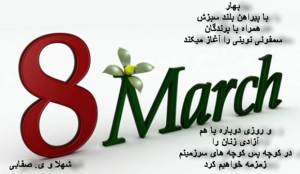
امروز مبارزه در جهت رهايی زن، يکی از عرصه های مهم آزادی جامعه است.
به بيان ديگر اگر در جامعه ای زنان آزاد و حقوق برابر با مردان نداشته باشند در آن جامعه،
آزادی گوهری ناياب است.
ما روز هشت مارس را به همه زنان و مردان آزادیخواه و برابری طلب شادباش میگوييم.
به اميد اين که جامعه ای در ايران بسازيم که عاری از هرگونه
سرکوب و سانسور، ستم و تبعيض و بهره کشی باشد.
شهلا و ی. صفایی
********************
۲ شعر به مناسبت روز جهانی زن
خدامراد فولادی
١
دوستت دارم را پاک کرده اند
از حافظه ی مرغ عشق
آنان که
دوستت ندارم را
ورد ِ زبان ِ
عروسک های خانه نشین کرده اند
عشق تبعید شده
از شاه بیت غزل
به کنج خانه
و شعر امروز
کلمه ای ندارد
همقافیه کند / با عشق.
شعری باید ساخت
به الفبای بی مرز عشق
که در آن
پرواز کند پرنده ی عاشق
و بنشیند
روی چشم ِ کهکشان
و روشن کند
برای همیشه
تاریک ترین حفره های جهان را.
٢
پیشکشی به همسرم
مگذار بی تو لحظه ای تنها بمانم
از شوق دیدارت مبادا جا بمانم
زلف ِ بلندت را بیفکن در ته ِ چاه
مگذار تا در تیرگی تنها بمانم
چون نارون بر آفتابم سایه افکن
ای سبز! بر من سایه افکن تا بمانم
شعرم، که بی تو ارزش ِ خواندن ندارم
در من نشین ای واژه تا خوانا بمانم
خواب خوشی در بستر تنهایی ِ من
یک دم مبادا بی تو ای رویا بمانم
بر کشتزارم ابر باران زا تو هستی
بی تو چه سان ای ابر باران زا بمانم
تو آفتاب پر شعور نور هستی
بر من بتاب ای نور تا دانا بمانم
چون توتیایی، دیده را بینا نمایی
بر دیده ام بنشین که تا بینا بمانم
زنبور ِ شعرم شهد از کام ِ تو گیرد
چون گرده در من ریز تا شیوا بمانم
در سرزمین ِ شعر یک کوه بلندی
می آیمت تا دنج ِ آن بالا بمانم.
برگرفته از روشنگری۱۳۹۲ اسفند ۱۰, شنبه
چارپاره ي يك سوگ٬ بفارسی و انگلیسی: مجید نفیسی
چارپاره ي يك سوگ
به ياد عزت طبائيان
پاره ي يكم
صدايم مي كنند
صدايم مي كنند
از پشت مِه سنگين ديماه
در پايه ي خونين اين كوهستان
صدايم مي كنند:
"با همه ي وسايل!"
برمي خيزم و همبندان مي خوانند:
"شكوفه مي رقصد
از باد بهاري
شده سرتاسر دشت
سبز و گُلناري."*
صدايتان را مي شنوم
اي خانه سازانِ شبانه!
در شامگاهي كه از دلِ زمين روئيديد
هر يك فانوسي در دست
و بجاي ي گچ، سطلي از نمك
و هر يك را به تساوي مي بريديد
ازين پارچه ي گسترده ي خاك
آنقدر كه بتوان
ازين چارديواري اجاري بيرون جهيد
و همان احساسي را كرد
كه غارنشين در غارش دارد
و اجاره نشين در خوابش.
همه چيز با تو آغاز شد
اي احساسِ ريشه دار شدنِ انسان!
با رويشِ شبانه ي خانه ها
در "خارج از محدوده"
با چشمهاي نگرانِ خشت چينان
و دستهاي گِل آلود دختران
و هيكل خونين كودكان
زير چرخهاي بولدوزر.
چيزي سبز مي شد بر زمين
و چيزي سبز مي شد در دل انسانها
و هر كس سهم خودش را مي خواست
از زندگي:
نهادن سر به بالين
و خوابهاي آشفته نديدن
از خق اجاره ي مالك
تا پول چاي ي پاسبان.
مي شنوم، مي شنوم صدايتان را
از پشت مِه سنگين ديماه
در پايه ي خونين اين كوهستان
صدايم مي كنند:
"با همه ي وسايل!"
برمي خيزم و همبندان مي خوانند:
"شكوفه مي رقصد
از باد بهاري
شده سرتاسر دشت
سبز و گُلناري."
پاره ي دوم
"وصيتي خاص ندارم كه بنويسم"**
تنها مي خواهم بگويم
آنچه را كه مي خواستيم بگوييم
در شبهاي ي شعرِ باغ
همراه با واژه كارانِ شبانه
زيرِ ريزش باران
و هياهوي گاردي ها
از پسِ ديوار.
در شبهاي شعرِ گوته
ما نواي ي گمشده ي خود را مي جستيم
در همسُرايي ي بزرگ انسان
و از ما دريغ مي كردند.
در خيابانهاي شهر گرد مي آمديم
و همنوا با واژه كاران
فرياد مي زديم:
"ما مي خواهيم پرنده باشيم
و با آزادي بخوانيم."
اين وصيت خاص من است.
پاره ي سوم
آه اين سوز چيست
كه از سوي ي تپه هاي ي اوين
تسمه مي كِشد
بر شقيقه ها و سينه ي من؟
آيا اين سوز زمستان آن سال نيست
از گرماي ي آتشي كه شيرهاي نفت را بستند
تا سردي ي آتشي كه بر شيرهاي شهر گشودند،
از سرنگوني ي كهنه
تا نگونساري ي نو،
از زهرچشمِ تنديسي كه در ميدانها فرو افتاد
تا ترشرويي ي چهره اي كه بر ديوارها نقش بست،
از فرمانِ جديد آتش
تا آتشِ نوين نافرماني؟
اي اميدِ بي حاصل من بگو
آيا بر سكوي ي همين قتلگاه نبود
كه ما درهاي اين زندان را گشوديم
با چشماني ي خيره
به آبكش هاي ي نيمه پُرِ برنج
كه زندانبانان كهنه
براي شام عزاي ي خود پالوده بودند
و زندانبانان تازه
براي پلوي ي عروسي خود پختند
و ما حصارگشايان
مرغان سر بريده ي آنها شديم؟
با گشودن زندان
ما بسته شدنِ هميشگي آن را مي خواستيم
و دستاربندان
گشودنِ حسينه اي در آن.
آه اين چه شوخي ي تلخي بود
كه اينك پايان مي گيرد
نه با لبخندي
كه با گلوله اي.
پاره ي چهارم
چشمانم ديگر نمي تواند ترا ببيند
آه اي عشقِ بي پايان يك ملت!
آه اي عشقِ بي پايان يك عاشق!
با كه از اين همه جسارت سخن بگويم
كه اين خاك
در "گورستان خاوران"
پيش از اينكه من با قامتِ هفتاد گزي ي خود
و دستهاي ي غول آساي ي فراخ گشوده ام
راست شوم
تا پيكر نازنينَت را بربايم
آوَخ، آوَخ
تو را بلعيده است
و مرا بجز سايشِ چشمي
نصيبي نمانده است.
ما خانه سازان و واژه كاران نگفتيم، نگفتيم
آنچه را كه مي خواستيم بگوييم
و لاجرم كاتبان دفترِ الله
مُركبِ كِلك خود را
در دهان ما چكاندند.
ما مي خواستيم، مي خواستيم
حق داشتن خانه اي را
و آنها برايمان نوشتند:
اشغالِ كاخِ طاغوت!
ما مي خواستيم، مي خواستيم
حق آزادي سخن را
و آنها برايمان نوشتند:
ايجادِ سانسورِ ياقوت!
ما مي خواستيم، مي خواستيم
حق اداره ي زندگي خود را
و آنها برايمان نوشتند:
دولتي كردنِ تابوت!
نفرين بر اين رونوشت
كه هرگز برابرِ اصل نيست!
اينك در اين خاك خونين
با تو چه گويم
اي شاهينِ سيمين بالِ من؟
تو رفته اي و ديگر
ترنُمِ هيچ كوزه ي آبي
چشمان زيبايت را نخواهد گشود.
اكنون چار سال، چار سال مي گذرد
از روزي كه من در بدرقه ي زندگيَم
چارميخ شدم
و تو در استقبال مرگت
چارپاره شدي.
آه اي مهرباني ي من
مهرباني ي يك انقلاب
آيا براي هميشه رفته اي؟
بگذار در سايه ي بالهاي ي هميشه گشوده ي خاطره ي تو
بر فرازِ قله ي فتح ناپذيرِ زندگيَت
براي خود كوزه ي آبي بيابم
كه روحم از شكنندگي ي استخوانهاي ي پوك شده ات
قاچ قاچ شده است
و چشمانم براي هميشه
جز سپيدي ي اين نمك
چيزي نخواهد ديد.
۷ ژانويه ۱۹۸۶ يا ۱۷ دي ۱۳۶۴
مجید نفیسی
*- از ترانه ي "شكوفه" ي ويگن. مي گويند كه هنگام بدرود با "عزت"، همبندان او در بند زنان اوين، اين ترانه را مي خوانده اند.
**- سطري از "وصيتنامه"ي "عزت" مورخ ۱۷ دي ۱۳۶۰.
A poem: "Four Parts of One Elegy":
http://www.iroon.com/irtn/blog/3732/
Chapter 5-B "Modernism and Ideology in Persian Literature":
http://www.iroon.com/irtn/blog/3731/
http://www.iroon.com/irtn/blog/3732/
Chapter 5-B "Modernism and Ideology in Persian Literature":
http://www.iroon.com/irtn/blog/3731/
Four Parts of One Elegy
In Memory of Ezzat Tabaian
In Memory of Ezzat Tabaian
First Par
They are calling me,
They are calling me
From behind the heavy mist of January
At the bloody foot of this mountain.
They are calling me:
“Get all your belongings!”
I get up, and my cellmates sing:
“Blossoms are dancing
In the spring wind.
The meadow is all green
And red as pomegranate flower.”*
I hear your voices, your voices
Oh, nocturnal home-builders!
When you grew that night
From within the earth.
You were carrying lanterns,
And, instead of marking-lime,
Buckets of salt in hand.
You parceled out equally for all
From this vast common land
So that you could get rid of tenancy
And feel the same joy
That a cave man had in his cave
But a tenant has only in his dream.
Oh, the feeling of having roots!
Everything started with you
When the houses in shanty towns
“Outside-the-zone”** began to grow
In the worried eyes of bricklayers
The muddy hands of teenaged girls
And the bloody bodies of children
Under the wheels of bulldozers.
It was growing before our eyes
It was growing inside our hearts
And everybody wanted his share of life:
Laying his head on his pillow
Without having nightmares
About a late rent payment
Or a policeman’s tea-money.
I hear your voices, your voices
From behind the heavy mist of January
At the bloody foot of this mountain.
They are calling me:
“Get all your belongings!”
I get up, and my cellmates sing:
“Blossoms are dancing
In the spring wind.
The meadow is all green
And red as pomegranate flower.”
Second Part
“I have no special bequest”***
I only want to write
What we wanted to say
Alongside the nocturnal word-makers
In the nights of poetry readings****
At the rainy Goethe Garden****
With the hubbub of riot police
From behind the walls.
In the nights of Goethe readings
We were searching for our lost voices
In the great human chorus
But they denied us.
So we gathered on the streets
And raised our voices
With our word-makers:
“We want to be birds
And sing in freedom.”
This is my special bequest.
Third Part
Ah! What is this chill
From the Evin hills
Whipping my temples and chest?
Is it not the chill of that winter?:
From the warm fire of the workers
Who shut down the oil pipelines
To the cold fire of machine guns
Opened shamelessly toward the crowd,
From the collapse of the old order
To the free fall of the new,
From the threatening gaze of statues
Toppled in city squares
To the frowning faces of a man
Painted on the city walls,
From a new order to fire
To the fire of the new disorder.
Oh, my barren hope
Speak to me
Was it not at the place of this slaughter
That we opened the gates of this prison?
Startled at the sight of colanders
Half-filled with steaming rice,
Which the old prison guards had rinsed
For their own funeral supper
And the new prison guards cooked
For their own wedding,
And we, the liberators,
Became the beheaded hens of their pilafs.
We opened the gates of this prison
To shut it down forever,
But the men with turbans
Only wanted to add a mourning hall
Where they can beat their chests for Hossein.
Ah! What a sad farce it was.
Now it ends
Not with a smile
But with a bullet.
Fourth Part
My eyes can no longer see you
Ah, you infinite love of a nation
Ah, you infinite love of a lover
To whom can I speak of this courage?
The earth in the Infidel cemetery
Has already devoured you
Before I could stand upright
With my hundred-yard height
And my gigantic wide open arms
To snatch your beloved body.
Alas, nothing is left for me
But to wipe my tears.
We, the home-builders and word-makers
Did not say, did not say
What we wanted to say
And as a result
The scribes of Allah’s office
Dropped the ink of their quills
In our mouths.
We wanted the right of housing
But they wrote for us:
“Occupying the palace of the tyrant!”
We wanted the right of free speech
But they wrote for us:
“Establishment of Islamic censorship!”
We wanted to govern ourselves
But they wrote for us:
“Nationalization of death.”
Curse on all duplicates!
They never match the originals.
Now in this blood-drenched land
What can I tell you
My silver-winged falcon?
You are gone
And no whispering water jar*****
Will open your beautiful eyes.
Now, four years, four years have passed
Since in departing my life
I became quartered
And in welcoming your death
You became a quatrain.
Ah, my gentle love
Love of a revolution
Are you gone forever?
Let me find a jar of water
In the shade of your memory
Which hovers with open wings
Over the insurmountable summit of your life.
My soul has become parched
Along with your fragile hollowed bones
And my eyes cannot see
But this white wall of salt.
January 7, 1986
Majid Naficy
*- This is from a popular song performed by the late Armenian-Iranian singer, Vigen. It was sung by Ezzat’s cellmates in the Women’s Ward in Evin Prison as she was called for execution.
**- In summer of 1977, people protesting the zoning regulations stoned the government buildings and began to build their houses without permits at night on the periphery of Tehran. It marked the beginning of the February 79 Revolution.
***- A line from Ezzat’s Will, written before she was taken to the execution field on January 7, 1982.
****- In the autumn of 1977, the Iranian Writers Association organized ten nights of poetry in the Goethe Institute where thousands of intellectuals protested against censorship.
*****- In Iran it is customary to pour water on graves as a blessing
اشتراک در:
نظرات (Atom)

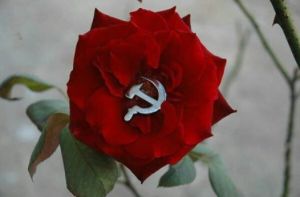
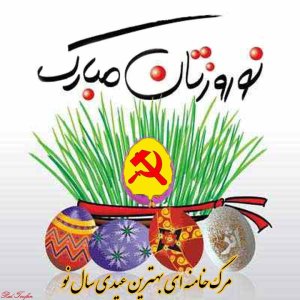
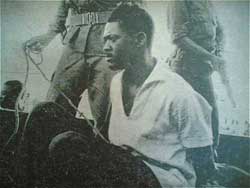
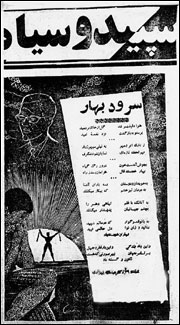
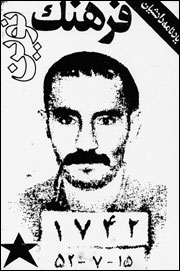
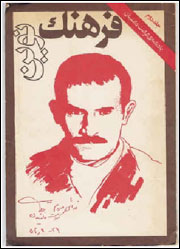
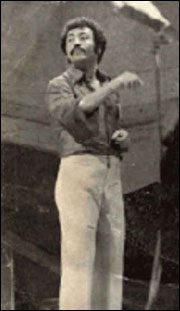
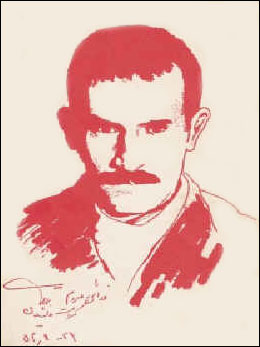
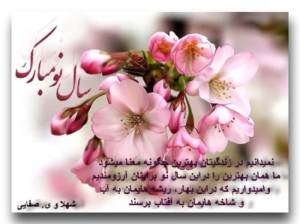
![majid-nafisi-c[1]](http://eshtrak.files.wordpress.com/2014/03/majid-nafisi-c1.jpg)
